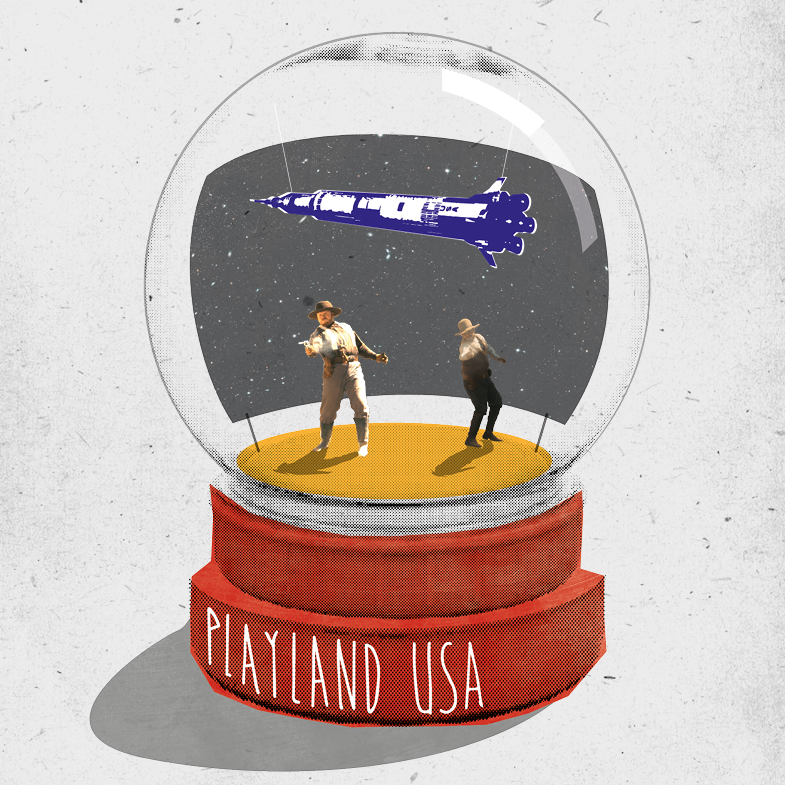History is made
For his fascinating documentary „PLAYLAND USA“, German director Benjamin Schindler embarked on a journey through the United States of America as a kind of modern myth researcher for the scenes of the great narratives that move the country and to which the nation appeals. He tries to fathom the sonorous rhetoric of America as “The Chosen Nation” and thereby presents a panopticon of a community that constantly has to assure itself of its self-certified exceptionalism through a cosmos of images in which it appears to be caught.
The myth is a story without a narrator, as theorized by Roland Barthes, the French cultural scholar who explored the „myths of everyday life“ in consumer society. This makes it an ingenious move for the director to do without a „tour guide“ on his journey, which is also a journey through the imagined and filmed history of the United States. There is no voice-over to set a direction; Benjamin Schindler trusts entirely in the assembly of formal associations and symbolic images as well as a complex sound design. His journey leads through different time periods, through topographical locations and pseudoplaces – places charged with (hi)stories whose realities seem to consist of pop-cultural images. Implications are evoked in the viewer that show in an intelligent way just how effective, timeless, and suggestive the myths are that make up the American Dream, and that their scope and impact are not limited to the US.
Many of the protagonists are „living historians“: by means of re-enactments and adapting events from the past, they attempt to lift the distance between past and present. They strive for authenticity and at the same time address the ghostly power of cultural images and scenes that are indelibly imprinted on us and live on. These pictures are not from the history books, however; they come from the canon of the cinema. They come from the dreams and visions that the classic Hollywood film has produced and are now experienced as reality. A representative of the indigenous population visited by the director on a reservation recalls that the corners and edges of these great narratives have been grinded away. The self-conception of the United States springs from a heroic picture of history in which the dark sides of its past appear only marginally. But regardless of their truth, could not the wise words of the charismatic Native American come from a movie? The film asks essential questions: What is seeing? How do we see the world? And: What is invisible, for us, for others? How can that which is invisible be deciphered and thus recovered?
In Benjamin Schindler’s daring and successful film experiment, different realities meet. By evoking films and narratives that are a formative force in US society, including genre and movie quotes from history to disaster movies without becoming explicit (nevertheless making them immediately recognizable through their archetypes), Schindler succeeds in blurring the lines between fiction and documentation in the imagination of the viewer. The hidden elements in his picture puzzle film become visible. Different levels, both narrative as well as non-narrative, are linked. The viewer is led into in a sensual-poetic experiential space, a „twilight zone“, in which he finally enters an oniric, dreamlike state.
The viewer’s experience of watching „PLAYLAND USA“ is complex and multidimensional. There is a self-reflection regarding film as a medium in which a blurring between film and reality in the dream movie experience is once again reflected. In addition, „PLAYLAND USA“ cleverly questions the possibilities and limits of the representation of history.
But even more: Benjamin Schindler draws connecting lines between the past and the present: Films have always utilized historical material, and the question of their authenticity has always been challenged. Still, more people today than ever before obtain their historical knowledge from audiovisual media and do not reflect on what is fact and what is fiction. They consume myths, a suggestively reduced world view which despite drawing from history, at the same time has evaporated history. Populists like Donald Trump, himself a „TV offspring“, a figure from the media-imprinted picture cosmos of the USA, have recognized that complex globalization processes overwhelm many. Figures like him know the collective longing for simple narratives and use their urge for escapism by filling myths with new updated meanings.
At the same time, in the last few years another trend has taken hold: everything, even the anonymous and ahistorical, is now equipped with a story. We live in a society of the authenticity cult. We fetishize the „real“ – whatever is meant with this vague term. We long for originality: for the good, true, simple things. To create this authenticity, history is simulated – like performers of re-enactments do. Populists are brilliant at playing this card of social obsession with authenticity. The we-versus-the-top rhetoric plays with the yearning for authenticity and the real, leaving the facts behind. The bottom line of Benjamin Schindler’s film remains: „PLAYLAND USA“ is a clever and entertaining survey of the USA and simultaneously a subtle, excellently composed reflection on the power of the film medium and Hollywood as the dream machine.
Sven Pötting (Filmgazette)
